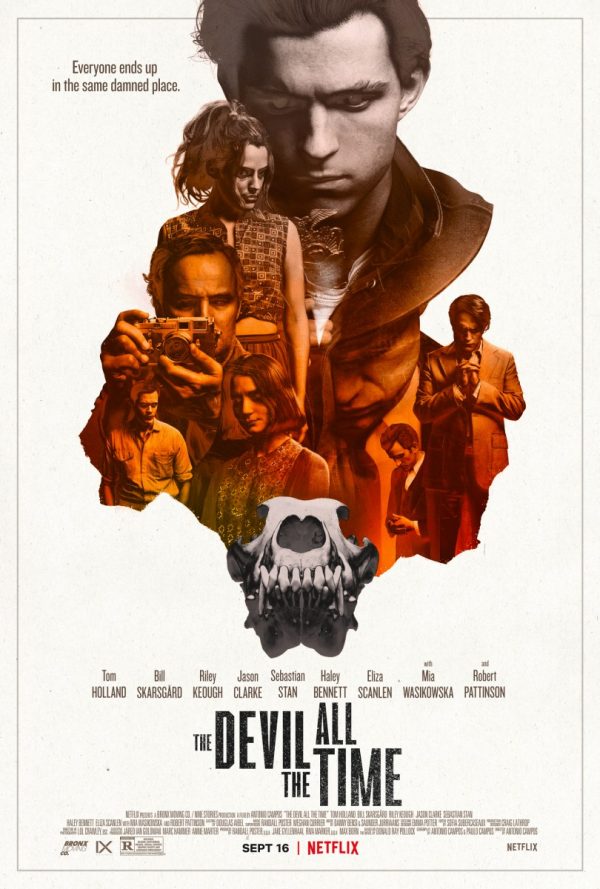The Devil All the Time, 2020.
Directed by Antonio Campos.
Starring Tom Holland, Eliza Scanlen, Sebastian Stan, Robert Pattinson, Riley Keough, Jason Clarke, Bill Skarsgård, Haley Bennett, Harry Melling and Mia Wasikowska.
SYNOPSIS:
In a tiny Ohio community, the lives of various people intertwine in macabre and violent ways.
Southern Gothic is one of the most underused genres in cinema. There might be the occasional Stoker or Killer Joe but, for the most part, these movies characterised by bleakness and often poverty simply don’t get made in Hollywood. Thank goodness, then, for Antonio Campos’s sprawling and compelling thriller adaptation The Devil All the Time. It’s a poetic tale of American darkness that crackles with spice through multiple characters and storylines like a southern-fried Richard Curtis movie. It’s Gothic, Actually.
There are only a few hundred people living in the towns of Knockemstiff, Ohio and Coal Creak, West Virginia – quiet, isolated communities in which the church is king and everyone knows everyone, but secrets go unspoken. Arvin Russell (Tom Holland) exists in the shadow of the shocking actions of his late father (Bill Skarsgård), now living with his grandparents and teenager Lenora (Eliza Scanlen), whom they adopted as a young orphan. The arrival of a flamboyant young preacher (Robert Pattinson) changes the complexion of the town, while a serial killer couple (Jason Clarke and Riley Keough) carries out depraved violence on the roads nearby.
Campos, who co-wrote the screenplay with his brother Paulo, crafts Donald Ray Pollock’s 2011 novel into a quietly bubbling cauldron of gothic dread, amplified by Lol Crawley’s moody cinematography and a minimalist score by Danny Bensi and Saunder Jurriaans. The most extreme violence occurs off-screen, with the aftermath often portrayed in grisly tableaux, though there’s a sense that all of these characters have blood, as well as dirt, underneath their grubby fingernails. The central mantra of Holland’s Arvin, nabbed from his father, is not “with great power comes great responsibility”, but the more nihilistic “there’s a lot of no-good sons of bitches out there”.
But more villainous than these slippery, murky characters is the film’s great, all-pervading spectre of evil: religion. The sign of the cross looms large over the story, with many of the characters twisted into inhuman moral contortions by their devotion to their particular interpretation of the word of God. Harry Melling’s uncomfortably intense preacher veers from pouring spiders on to his face out of sheer faith to committing grotesque acts in the name of his deity, while Robert Pattinson slimes and squirms as a toxic Bible-bro who twists scripture into a justification for his sleazy antics with God-fearing teenage girls.
This is a movie about cycles of violence and the ways in which consequences ripple through generations. In a similar fashion to Derek Cianfrance’s The Place Beyond the Pines, the movie examines the inescapable recycling of brutality across family trees, and does so with more coherence than was achieved by Cianfrance’s clear triptych narrative structure. When one character in The Devil All the Time is seen openly yawning at an announcement of escalation in the Vietnam War, it’s as clear a symbol as possible that conflict and bloodshed have become shockingly commonplace for these people.
The performances are uniformly strong, with Holland’s quiet brooding an ideal counterpoint for the more theatrical work of Pattinson – he extravagantly yells the word “delusion” as if it has five syllables. It’s a very different role for Holland to his energetic, peppy Peter Parker, but he brings a discomfort and a sadness to the character that fits him like a glove. Riley Keough, too, is a standout, adding layers and depth to a character who could easily have been a one-note sexpot caricature – often conveying her inner questions with facial expressions alone, or the way her hands sit on the steering wheel of the car she’s almost always driving.
Campos brings grim style to the wandering paths and intersecting narratives of The Devil All the Time, keeping the pacing stately even as the misery rises and the bodies stack up. There are times when the movie threatens to lose focus – Sebastian Stan’s crooked sheriff is a bit of a damp squib – but for the most part, this train keeps chugging on down the rickety tracks to its blood-soaked conclusion.
It’s a movie that exists in grey areas – both literal and figurative – in order to extract and illuminate the darkness found within the heart of 20th century rural America. In the process, it can tell us a lot about the state of those places today. “It probably hasn’t changed much,” says one character in the third act, “little towns never do”.
Flickering Myth Rating – Film: ★ ★ ★ ★ / Movie: ★ ★ ★ ★
Tom Beasley is a freelance film journalist and wrestling fan. Follow him on Twitter via @TomJBeasley for movie opinions, wrestling stuff and puns.














